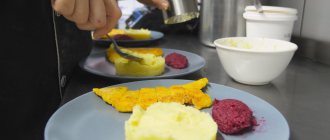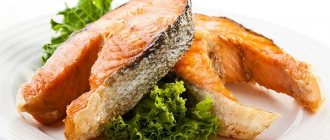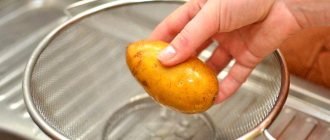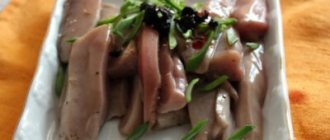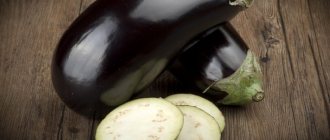On culinary forums, disputes often arise about when to salt potatoes when boiling. Most housewives agree that salt should be added to boiled tubers at the beginning of cooking, and to fried and stewed tubers - at the end. But in reality, everything is not so simple, and a lot depends on the type of seasoning and the characteristics of the dish.
6. Add absorbent product
Some products have beneficial absorbent properties, e.g. able to absorb excess salt. Such products include potatoes, starchy cereals, pasta, and fresh herbs. So, in an over-salted soup, you can put a few chopped potatoes or add 100-150 g of rice - these ingredients will absorb excess salt. If you don’t want to spoil the dish with extra food, you can put the potatoes in whole so that they can be easily taken out later, and place the cereals in the soup in a fabric bag.
If you have over-salted rice, buckwheat, pilaf, millet, pasta dishes
- buckwheat
or other grains in a colander, rinse, and put back into the pan. Pour boiling water over it, just a little, so that it can simmer. Add a piece of butter and place on low heat and simmer for about 10 minutes. - Over-salted boiled rice
can be saved by washing it in cold water, or by following the method described above. - pilaf
without losing quality, but this can still be done by adding a cooked portion of unsalted rice and mixing with salted pilaf. Adding a handful of raisins also helps; they will absorb excess salt. Use rice to stuff cabbage rolls, peppers, meatballs, adding it to the minced meat, not forgetting that there is no need to add salt. - Over-salted pasta, for example, navy style
, can be saved by adding any unleavened sauce. You can also dilute the salty taste by adding other boiled pasta. Another way is to put the pasta in a frying pan and pour the eggs over it, cover with a lid and bring the dish to readiness.
As you can see, you shouldn’t resort to extremes, fall into despair or throw away over-salted dishes. As you already understand, the taste can be restored, enhanced, even simply served with champagne and no one will notice your mistake. Even in cooking there are no hopeless situations and any home recipe
8. Recycle Over-Salted Foods
So, from over-salted meat or fish, you can prepare a delicious, hearty pie filling by adding additional ingredients (vegetables, cereals). Over-salted vegetables can be processed into puree by adding pureed vegetables boiled without salt.
There is only half an hour left before the guests arrive, and having dressed up, you quickly try the salad prepared according to a long-proven recipe, but suddenly you realize that the dish is too salty... Tragedy? Catastrophe? Nothing like this! In no case should you panic, because food that seemed hopelessly spoiled can easily become not only edible again, but also surprisingly tasty. To fix everything, you just need to enlist the support of experienced chefs who will offer you simple tips, some of which are presented below.
What to do if you over-salted the soup?
It is known that even the most aromatic and richly flavored soup can lose its invaluable qualities if it is over-salted. However, in the case of this particular dish, there are three ways to cope with the problem.
1. Sugar is the best enemy of salt.
The simplest thing you can do is add a pinch of sugar to over-salted soup. No matter how strange it may look, it is sugar that can most quickly cope with the problem that has arisen, being a contrasting flavoring substance that can not only eliminate excess salt, but also enhance your taste sensations when eating the saved soup.
2. More liquid!
Another method, also widely used by cooks, is no less simple: you need to add unsalted broth or just boiled water to the soup. The best option, of course, would be broth, and not because adding it may just seem more natural, but for the reason that it is the broth that will mix with the other ingredients in a matter of minutes and you will immediately understand whether you need to continue adding to the soup liquid, or it no longer seems over-salted. Unlike broth, it will take some time for the soup to mix properly, and it is quite possible that after adding water and tasting the soup again, you will not notice any difference and decide to continue adding more. But in fact, you should just wait and only then take the sample. It is possible that much water will not be required.
What to do if a dish is too salty
It’s not difficult to over-salt a soup, meat dish or porridge: just one awkward movement of your hand is enough. But fixing the resulting problem is much more difficult. How can you save over-salted food? What to do if a particular dish is too salty? Let's find out more about this right now.
It is almost impossible to eat over-salted food, but simply throwing away food that took a lot of time, effort and money to prepare is not the best solution. ’s much better to try to save the dish
, especially since there are quite a lot of ways to do this. The methods of “rescue” will depend on which particular dish turned out to be over-salted.
What to do if the soup is too salty?
If you oversalted the soup
, then you can choose the simplest way - dilute it with clean boiled water. However, depending on the degree of salting, you may need quite a lot of water, and this will not change the taste of the soup for the better. In addition, adding water may make the soup cloudy.
In this regard, it is recommended not to dilute salted soup with water, but to add various salt “absorbers” to it, which will help reduce the salinity of the soup. For example, you can put a gauze bag filled with rice into your soup
: Cook the rice in the soup until done and remove. The rice will absorb excess salt.
Related article: Solanine in potatoes - can you eat green potatoes?
Another popular “salt absorber” for soup is raw potatoes.
. Dip a few raw potatoes into the soup and simmer for 5-10 minutes. Be careful not to overcook the potatoes, otherwise your soup may become cloudy. Less effective than potatoes and rice, but still quite effective, noodles, so you can try to save your over-salted soup with its help.
What to do if a meat or fish dish is too salty?
If you are unlucky enough to over-salt a meat or fish dish
, then the situation is more complicated. You can try to remedy the situation by preparing some unsalted sauce or side dish of your choice. You can also add some tomatoes, herbs or lemon juice to the meat or dish - these products tend to somewhat neutralize the salty taste of food.
To correct the taste of an overly salty meat or fish dish, you can also try stewing this dish with unsalted vegetables
. Vegetables will “take up” the excess salt, and the dish will acquire a normal taste. Alternatively, you can use over-salted meat or fish to fill the pies, again adding unsalted vegetables.
What to do if the side dish is too salty?
If you oversalt your porridge
, the following trick will come to your aid. Rinse cereal porridge, for example, rice or buckwheat, several times with cold water and let the liquid drain. Return the porridge to the pan, add a little boiled water and butter. Place on low heat and simmer, covered, until the water has evaporated. Your porridge should now be less salty.
Over-salted vegetables, boiled whole as a side dish
, you can save it if you drain the water in which they were boiled and instead pour fresh (boiled) water into the pan. Boil the vegetables for a few minutes after boiling, then turn off the heat and leave for 10-15 minutes. Excess salt will “go” into the water.
If your mashed potatoes
(or puree from other vegetables), then you can try several ways to correct the situation. For example, add milk and butter to the puree, or simply mix your salted puree with a portion of unsalted puree. Of course, in the latter case, the unsalted puree will have to be cooked separately.
Fried potatoes on the side
It can also be saved by adding unsalted potatoes to it. You can also try adding herbs and sour cream to the potatoes - this will reduce the salty taste.
As you can see, almost any over-salted dish can be corrected if you use some culinary tricks. However, as you know, any problem is always easier to prevent than to solve, and therefore try to salt dishes at the end of cooking, add salt little by little and be sure to take into account the initial saltiness of the products used.
Sources:
https://onwomen.ru/kartoshka-peresolena.html https://delafe.ru/page/esli-peresolila-kartoshku-kak-vse-ispravit https://m.baby.ru/blogs/post/335854396- 335040762/
What to do with leftover over-salted potatoes?
Even if the hostess decided not to take risks and boiled or fried a new portion of potatoes for the guests, over-salted food should not be thrown away. Boiled or fried potatoes are added to salads and vinaigrettes.
Fillings for pies and dumplings are made from boiled potatoes:
- from potatoes with cottage cheese;
- from potatoes with buckwheat and fried onions.
- Over-salted boiled potatoes will serve as the basis for the dough:
- 500 g potatoes;
- 1 cup (250 ml) flour;
- 1 egg.
This dough is universal. Dumplings are made from it: rolled into sausages, cut into pieces, boiled in salted water and served with fried onions, mushrooms or any gravy. Dumplings with plums or cherries are made from the same dough (a piece of refined sugar must be placed inside), boiled and served with crackers fried in butter and sour cream. The dough is also suitable for potato bowls with cabbage, mushrooms or meat. Zrazy are breaded and fried in vegetable oil.
Potato dough - the basis for zrazy with cabbage
When to salt depending on the salt
The taste of a dish is influenced by many factors, including the type of salt. Therefore, it is important to know not only how to cook potatoes, but also how to use additives.
Popular seasoning is classified into the following types:
- Stone. This is a natural mineral compound, and when boiling potatoes, water can be added to it at any stage - both at the beginning of cooking and when serving.
- Iodized. Contains iodine molecules that interact with starch, which is present in tubers. This reaction can cause the potatoes to darken, so you need to add salt to the dish a few minutes before turning off the heat, or better yet, when it is already ready. This will preserve not only the aesthetic appearance of the tubers, but also most of the beneficial properties of the seasoning.
- Marine. Contains many useful compounds, micro- and macroelements. When used correctly and in moderation, it helps replenish mineral deficiencies in the body. This seasoning can only be added to prepared dishes, since during heat treatment most of the substances are destroyed or evaporated, which negatively affects not only the taste, but also the nutritional value of the food.
- "Extra". The most “scandalous” type of salt, because it has a richer taste than the others. This feature must be taken into account, otherwise the food will be irrevocably spoiled. You can add this seasoning at any stage of cooking.
Any type of salt is suitable for potato dishes - the main thing is to use the additive correctly and in moderation.
How not to over-salt potatoes
People say: if a woman over-salts a dish, it means she is in love. There is some truth in this saying: the thoughts of a person in love are far from cooking. People whose attention is distracted often add excessive amounts of salt and seasonings to food without looking. Before salting a dish, you need to focus on the taste sensations, preferably turn off the TV.
To someone who has already eaten something salty, subsequent food seems more bland. Potatoes are most often over-salted by adding salt after the first or second test. To avoid such trouble, before trying the dish, be sure to drink one or two sips of water.
It should also be taken into account that many manufacturers include salt or monosodium glutamate in the composition of ready-made spicy mixtures. Therefore, food is first seasoned with spices and then with salt.
It’s a good habit to add a little less salt to your food during cooking. Then each of those sitting at the table salts the food to taste.
One of the universal products that every housewife has in their bins throughout the year is potatoes. It’s not surprising, because you can cook anything from the root vegetable - stew, potato pancakes, add it to a salad or soup, or just fry it. During the cooking process, unforeseen situations happen, for example, you added too much salt to a dish. Is there any way to correct the situation?
I over-salted the potatoes: what to do and how to fix it?
The root vegetable can be prepared in different ways - baked, boiled or fried. Thanks to spices, you can give it the desired taste and aroma. Well, of course, no housewife can do without salt, because without it the dish will be bland and tasteless. If you haven't added enough salt to the dish, the situation can be easily corrected. What if you added too much salt? Do you really have to throw away the food and start cooking again?
First of all, do not panic, because if desired, the situation can be corrected. Of course, if you added a lot of salt, then most likely you will have to throw away the dish and prepare a new one. But in most cases you will be able to revive him.
What should I do if I over-salt my fried potatoes? Many people ask this question. First of all, remember: you need to add salt 10-15 minutes before the end of cooking, and not at the beginning. There are not many ways to use fried potatoes. You need to add an ingredient with a neutral taste to the dish, for example eggs or mushrooms. Just beat 2-3 eggs or chopped mushrooms into the pan, continue cooking for another 10 minutes, do not forget to stir.
You might be interested in our article How to cook accordion potatoes in the oven
If you have the time and inclination, you can fry a couple of potatoes separately without adding salt, then add them to the pan with the dish and stir.
What to do if you over-salt your stewed potatoes? If you have added too much salt to boiled potatoes, drain the water from the pan and rinse it thoroughly 1-2 times. Pour water into the container and put on fire, cook for another 10 minutes.
We recommend adding whole, over-salted boiled potatoes to a salad or other appetizer, since the situation cannot be corrected. Or you can serve boiled and peeled potatoes with sour cream and herbs.
Over-salted puree: what to do?
Even though you added just a little salt, the dish was too salty. Prepare a little more puree separately and mix it with the salted one. If you don’t have the time or desire for this, add a piece of butter, sour cream or milk to the dish.
What to do if potatoes are over-salted
Now, it is probably difficult to even imagine how people used to live without potatoes.
But it appeared in Russia relatively recently - Peter I brought it to us, and since then potatoes have become part of traditional Russian cuisine. The number of dishes that can be prepared from potatoes is simply enormous. There is probably no person in the world who does not like fried potatoes or mashed potatoes. But what to do if suddenly the dish turns out to be too salty? You can, of course, blame everything on falling in love, but don’t leave the whole family hungry! Is it possible to somehow save over-salted potatoes? Let's try it!
6. Add absorbent product
Some products have beneficial absorbent properties, e.g. able to absorb excess salt. Such products include potatoes, starchy cereals, pasta, and fresh herbs. So, in an over-salted soup, you can put a few chopped potatoes or add 100-150 g of rice - these ingredients will absorb excess salt. If you don’t want to spoil the dish with extra food, you can put the potatoes in whole so that they can be easily taken out later, and place the cereals in the soup in a fabric bag.
Add a little sour or sweet
You can neutralize salt by adding lemon juice, acid, mustard or vinegar. Any sour taste can be easily overcome by a salty one, so take advantage of this property. This method works great if you suddenly over-salted fish, meat, chicken and other foods, but realized it too late, when the dish was already ready. Add acid drop by drop, as too much will also spoil the taste.
If you don’t like sourness in taste, or you don’t have anything suitable at home, then add a little sweet taste to the over-salted dish. It can be honey, any vegetables, especially sweet ones, fruits. For example, fresh carrots can save over-salted fish fillets. Grind the vegetable, mix with meat or place it on top. The carrots will absorb excess salt, so the taste will return to normal.
It is important!
Finally, a few life hacks. The ability to save a situation is good. But it is much more important to avoid such situations. Simple rules will help with this:
- Salt while cooking, not on the plate. Do not throw out all the salt prescribed in the recipe at once. Perhaps it will be too much for you.
- Iodized salt often requires less than regular salt. Many perceive the taste of iodine as a salty taste.
- Salt dishes containing salty ingredients especially carefully: cheese, capers, pickled mushrooms or cucumbers, soy sauce, bacon are not only salty in taste - they impart it to the entire dish.
There are no hopeless situations for a savvy housewife. An over-salted dish can almost always be saved. But it’s much easier to be vigilant, avoiding culinary misfires.
How to remove excess salt from pilaf?
An excellent way to help remove excess salt from pilaf is raw potatoes. Peel one or more medium-sized root vegetables, drown them in rice, boil for 5-15 minutes - the potatoes will absorb excess salt. Then carefully remove with a slotted spoon.
Interesting materials:
How to dress at 20? How to dress a newborn according to the weather? How to dress in Crimea in November? How to get a free subscription to MyBook? How to arrange a reading diary in a notebook? How to arrange boxberry delivery? How to arrange delivery to a parcel terminal? How to register an employee for 0.25 pay? How is the report prepared? How to stun an enemy in Assassin's Creed Unity?
How to avoid oversalting
Rather than redoing what has already been done, it is easier to prevent this from happening - that is, always be attentive to the process of adding salt to the dish and follow simple rules:
- Always under-salt the dish a little - you can add more salt later, when the dish is almost ready. This can be done even while eating - remember, there are always salt shakers in canteens for these purposes.
- For one kilogram of minced meat or fish, two level teaspoons of salt are required.
- When kneading dough, take one small heaped teaspoon of salt per kilogram of flour.
- To prepare crumbly buckwheat porridge, take 2 level teaspoons of salt per half a kilogram of raw cereal.
- It is better to salt all dishes at the end of cooking, the only exceptions being boiled potatoes and fish soup.
Add water
Regular drinking water will help save the dish in most cases. To do this, do the following:
- pour the food into a clean, dry pan, put it on the fire to heat up;
- when the food becomes hot, add 3-4 tbsp. water, wait until it boils and taste it. If you feel salt, add more water, but not more than one glass.
This method is suitable for liquid dishes: sauces and gravies can be diluted with water in an unlimited amount. Using the same principle, you can “reanimate” spoiled soup, but just remember to bring the liquid to a boil before adding it. If you add water to a cold product, the meat broth is likely to become cloudy and lose some of its flavor.
If you have oversalted vegetables, cereals, pasta, the same water will help correct the situation. Transfer the food to a colander, turn on a little cool water pressure and rinse the contents for a few minutes. Excess salt can be easily removed and water will immediately absorb it. Then wait until all the liquid has drained from the colander, blot the contents with a napkin and taste the product. You may need to salt it a little again.
